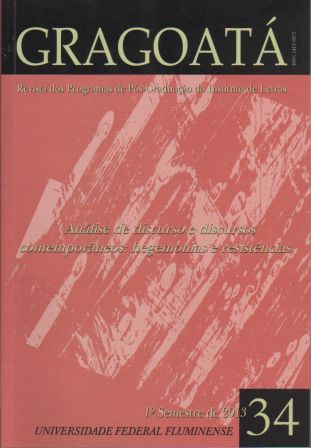Discursive materiality and the functioning of ideology and the unconscious in the production of meaning
DOI:
https://doi.org/10.22409/gragoata.v18i34.32961Keywords:
ideology, unconscious, sense, historyAbstract
Affiliated to the perspective Speech´s Analysis (SA), we understand speech´s subject as being radically historical- constituted by the language, ideology and affected by the unconscious. This statement of position imposes take into consideration production´s conditions in capitalist society, such as the exploration of labor and the production-consumption of commodities. Being the speech ideology´s materiality, it is always a historical practice and its operation reveals interpretation´s gestures of the subjects acting in social practices put as necessary to reproduction / transformation of production relations. Thus, presupposing the working of ideology and of unconscious in the production of sense effects, this article analyzes advertisements for mobile phone companies / mobile. They are presented videos in celebrations dates about Mothers´ Day and Fathers´ Day. In our analysis, we understand that these advertisements put operating the dominant ideology that “naturalizes”, through the evidence´s effects, the places of women and of men. This operation is essentially crossed by unconscious formations able to confirm with the effectiveness of sense effects. Therefore, these discursive materialities mobilize a network of sense that, in their intersection (symbolic materiality, ideology, unconscious), achieve and make working for and by subject the interests of the logic of capital, revealing a discursive process that returns and resignify the sense enrolled in the Other´s speech to converge in the realization of the interests of a “subject consumer” that “makes your choices” with “apparent” knowledge of cause.
Downloads
Downloads
Published
How to Cite
Issue
Section
License
Authors who publish in Gragoatá agree to the following terms:
The authors retain the rights and give the journal the right to the first publication, simultaneously subject to a Creative Commons license CC-BY-NC 4.0, which allows sharing by third parties with due mention to the author and the first publication by Gragoatá.
Authors may enter into additional and separate contractual arrangements for the non-exclusive distribution of the published version of the work (for example, posting it in an institutional repository or publishing it in a book), with recognition of its initial publication in Gragoatá.

Gragoatá is licensed under a Creative Commons - Attribution-NonCommercial 4.0 International.














